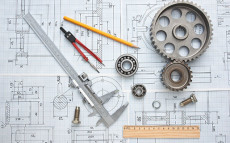- pathfindersAI
- Job Profile
Mechatronics Engineers
Summary
Mechatronics Engineers: A Gateway to the Future
What They Do
Mechatronics engineers stand at the intersection of mechanical, electrical, and computer engineering, merging these diverse fields into a cohesive discipline aimed at designing and developing smart machines. These professionals are creators of sophisticated systems that automate processes and enhance both productivity and efficiency in a wide range of industries. From robotics used in manufacturing to advanced medical devices, mechatronics engineers leverage their multi-disciplinary expertise to innovate and solve complex problems.
Job Responsibilities
The responsibilities of a mechatronics engineer are varied and complex, reflecting the interdisciplinary nature of the field. In a typical role, a mechatronics engineer may be involved in the conceptualization, design, development, and testing of automated systems. They work on the integration of mechanical components with electrical circuits and software, ensuring these elements function seamlessly together. Their duties often include collaborating with engineers from other specialties, managing projects, conducting research, and providing technical support. Moreover, they may be engaged in programming PLCs (Programmable Logic Controllers), designing control systems, and analyzing system performance to make data-driven improvements.
Essential Skills
A successful mechatronics engineer must possess a unique blend of skills that cross traditional engineering boundaries. Core competencies include a strong foundation in mechanical engineering principles, electrical circuit design, and computer programming. Proficiency in using CAD (Computer-Aided Design) software for creating detailed mechanical parts is essential, as is experience with control systems and automation technologies. Additionally, problem-solving skills, analytical thinking, and the ability to collaborate in multidisciplinary teams are crucial. Excellent communication skills are equally imperative, as mechatronics engineers must often explain complex technical concepts to non-engineers.
Educational Pathways
Becoming a mechatronics engineer typically requires an educational foundation in engineering disciplines. Prospective students usually start with a bachelor's degree in mechatronics engineering or a related field, such as mechanical engineering, electrical engineering, or robotics. The curriculum often includes courses in mechanics, electronics, computer science, control systems, and robotics. Many programs offer laboratory work and internships to provide hands-on experience. For those interested in advanced roles or academic careers, pursuing a master’s degree or even a Ph.D. can be advantageous. Continuous learning through certifications and professional development is also vital to stay updated with the latest technological advancements.
Career Prospects
The career prospects for mechatronics engineers are promising, given the ongoing expansion of automation and smart technologies across various sectors. Industries such as manufacturing, automotive, aerospace, healthcare, and consumer electronics are increasingly seeking mechatronics expertise to drive innovation and maintain competitive advantages. Job roles may include titles such as Automation Engineer, Robotics Engineer, Systems Engineer, and Control Systems Developer. With experience, mechatronics engineers can advance to managerial positions, lead research and development projects, or start their own tech ventures. According to industry forecasts, the demand for mechatronics engineers is set to grow robustly in the coming years, translating into attractive salaries and numerous employment opportunities.
Conclusion
The field of mechatronics engineering is a dynamic and multidimensional career path that offers the opportunity to work at the forefront of technological innovation. Combining mechanical systems, electrical circuits, and computer algorithms, mechatronics engineers design the smart machines that are transforming our world. With a solid educational background, a diverse skill set, and a constant drive for learning, aspiring mechatronics engineers can look forward to a fulfilling and high-impact career. As automation and smart technology continue to evolve, the role of mechatronics engineers will only become more integral to advancing industries and improving everyday life.
Video
Compensation
| State | Median Salary | Median Hourly | Positions |
|---|---|---|---|
| SD | * | * | 100 |
| AL | 136,990 | 65.86 | 3,480 |
| AK | 124,790 | 60.00 | 310 |
| AZ | 104,660 | 50.32 | 2,560 |
| AR | 73,160 | 35.18 | 500 |
| CA | 128,620 | 61.84 | 31,490 |
| CO | 124,440 | 59.83 | 2,590 |
| CT | 126,400 | 60.77 | 2,120 |
| DE | 131,980 | 63.45 | 210 |
| DC | 158,830 | 76.36 | 2,640 |
| FL | 100,140 | 48.14 | 8,080 |
| GA | 113,230 | 54.44 | 3,750 |
| HI | 119,770 | 57.58 | 720 |
| ID | * | * | 1,050 |
| IL | 107,490 | 51.68 | 2,740 |
| IN | 100,720 | 48.42 | 1,920 |
| IA | 87,940 | 42.28 | 420 |
| KS | 65,570 | 31.52 | 760 |
| KY | 84,340 | 40.55 | 890 |
| LA | 92,600 | 44.52 | 6,950 |
| ME | 102,480 | 49.27 | 650 |
| MD | 131,440 | 63.19 | 6,240 |
| MA | 120,460 | 57.91 | 3,180 |
| MI | 97,530 | 46.89 | 4,720 |
| MN | 108,360 | 52.10 | 1,900 |
| MS | 107,810 | 51.83 | 520 |
| MO | 95,980 | 46.15 | 1,610 |
| MT | 79,480 | 38.21 | 400 |
| NE | 75,560 | 36.33 | 460 |
| NV | 84,580 | 40.66 | 700 |
| NH | 108,550 | 52.19 | 590 |
| NJ | 125,270 | 60.23 | 3,670 |
| NM | 134,650 | 64.74 | 2,180 |
| NY | 109,170 | 52.49 | 5,570 |
| NC | 105,860 | 50.89 | 2,890 |
| ND | 83,990 | 40.38 | 260 |
| OH | 106,390 | 51.15 | 6,530 |
| OK | 101,760 | 48.92 | 1,130 |
| OR | 125,110 | 60.15 | 2,690 |
| PA | 100,280 | 48.21 | 4,850 |
| RI | 129,160 | 62.10 | 480 |
| SC | 106,540 | 51.22 | 1,640 |
| TN | 86,070 | 41.38 | 4,350 |
| TX | 108,380 | 52.10 | 8,200 |
| UT | 102,220 | 49.15 | 1,920 |
| VT | 100,490 | 48.31 | 550 |
| VA | 136,490 | 65.62 | 5,670 |
| WA | 113,190 | 54.42 | 2,740 |
| WV | 127,880 | 61.48 | 430 |
| WI | 101,040 | 48.58 | 770 |
| WY | 130,490 | 62.74 | 210 |
Similar Occupations
In this area you will find other occupations that are close to the one you were viewing in tasks, knowledge and work environment. If the primary job profile you are viewing isn't quite to your liking, take a look around and see what else is available.
Basic and Premium Accounts have more alternative occupations available than the Free account.

Calibration Technologists and Technicians - 17-3028.00
Calibration Technologists and Technicians are responsible for testing, maintaining, and adjusting precision instruments and equipment to ensure their accuracy and functionality. They meticulously calibrate a variety of devices, ensuring they meet established standards and specifications necessary for optimal performance.
-
$62,790/yr
Median Pay -
13,220
Number of Jobs

Electrical and Electronic Engineering Technologists and Technicians - 17-3023.00
Electrical and Electronic Engineering Technologists and Technicians assist engineers in designing, developing, testing, and maintaining electrical and electronic equipment. Their work includes tasks such as troubleshooting systems, drafting technical plans, and ensuring compliance with safety and industry standards.
-
$72,800/yr
Median Pay -
97,420
Number of Jobs